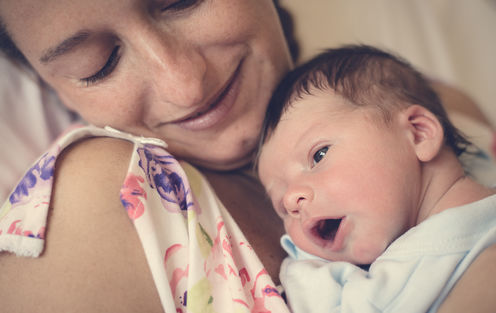
Doctors, nurses and public health practitioners give health advice with the best intentions. They want pregnant women and their babies to be physically and mentally healthy. They want to support women and protect families. They want new mothers to have the best available evidence at their fingertips, but also to “trust their intuition”.
Problem is, these well-intentioned health messages can have the opposite effect.
The potential unintended adverse consequences of health promotion campaigns are well known. Until now there has been little specific consideration of these for pregnancy and after birth. Our recently published research, based on discussions among small groups of women who had recently given birth, found that fear-based health messages can cause unnecessary anxiety.
Anxiety is an umbrella term that includes specific disorders, but also day-to-day experiences of excessive worry and preoccupation with the possibility of something bad happening. All women experience a degree of anxiety around pregnancy, birth and infant care but for about one in ten women anxiety can be persistent, disabling and warrant a diagnosis of a disorder. The proportion is similar to that in populations of women who are not pregnant or have not recently given birth.
Fear-based messages from practitioners and awareness campaigns can promote worry, and encourage perfectionism as well as personal responsibility for events over which new mothers may have little control. The messages focus attention on threatening material and worst-case scenarios. This can lead to feelings of helplessness.
Single-message health promotion campaigns can be a successful strategy to improve population health. Think road safety, tobacco control and immunisation. But because visual campaign material needs to attract attention and persuade, the imagery can be sensational and the content is inevitably over-simplified.
The sudden infant death safe sleep campaign, for instance, recommends putting babies to sleep on their backs and avoiding bed-sharing. The evidence for this is compelling. However, the campaign doesn’t state how uncommon sudden unexplained infant death is, which can lead parents to overestimate the risk and to check their sleeping babies constantly for signs of breathing.
Thankfully, Australia’s messages are less alarmist than a graphic US campaign that equates the risk to an infant of bed-sharing with a baby sleeping alongside a carving knife or meat cleaver.
beyondblue’s Just Speak Up campaign encourages women to disclose postnatal depressive symptoms without shame and seek professional help. These goals are worthwhile, but the single message can provoke feelings of vulnerability. Women can worry that postnatal depression is something that they can contract, like an infectious disease, rather than a response to difficult life circumstances.
The message can also lead women and their families to label the ordinary adjustment reactions, that will pass with time and practical and emotional support, as mental illness. It also locates the problem within the individual rather than promoting awareness of contributing factors that can addressed. This might be a baby who cries a lot and doesn’t sleep much, or a partner who criticises her, or doesn’t share the increased unpaid household work or baby care.
Evidence-based practice promotes shared or even self-directed decisions that are made on the basis of the best available information. It engages with evaluating the pros and cons of decisions. However, it can promote false notions of control over outcomes and can foster guilt in the event of an adverse event.
Inevitably, evidence-based practice operates in a world of imperfect information about the balance of probabilities and doubt about consequences of particular decisions. Ambiguity and uncertainty provoke anxiety. Scientific information about likelihood of an event is difficult to convey and understand. Single message health promotion campaigns can suggest greater certainty than may be warranted.
To complicate matters further, there is a widespread stereotype that mothering behaviours are instinctive rather than learnt. At the same time as being encouraged to evaluate the evidence for their decisions, new mothers are told to trust their intuition. This can lead them to feel incompetent when intuition isn’t enough to solve their infant feeding and sleeping problems, and it can undermine their confidence.
In reality, mothering well relies on detailed knowledge and skills but, unlike in other responsible occupations, few formal opportunities for learning are available.
Everyone who cares about protecting the mental health of new parents can follow the emerging advice, which is to:
- provide balanced information rather than worst-case scenarios
- dispel common misconceptions with accurate, consistent information
- avoid suggesting that mothering skills are intuitive
- give abundant praise for the important work that women are doing.
Women enter a complex world when they become pregnant and have a baby. There is a lot to absorb about pregnancy testing and health advice. All of this is amplified because of a woman’s growing emotional attachment to her baby. This starts in pregnancy, and motivates to her to care for and protect her baby – not just herself.
Health messages from authoritative sources that suggest possible dangers to the fetus or baby are therefore especially anxiety-arousing. Any perinatal health promotion campaign needs to consider potential harms as well as benefits.
Heather Rowe receives funding from the NHMRC, ARC, national and state government departments, and philanthropic trusts.
Jane Fisher receives funding from the NHMRC, the ARC, Grand Challenges Canada, national and state government departments, and several philanthropic trusts.
